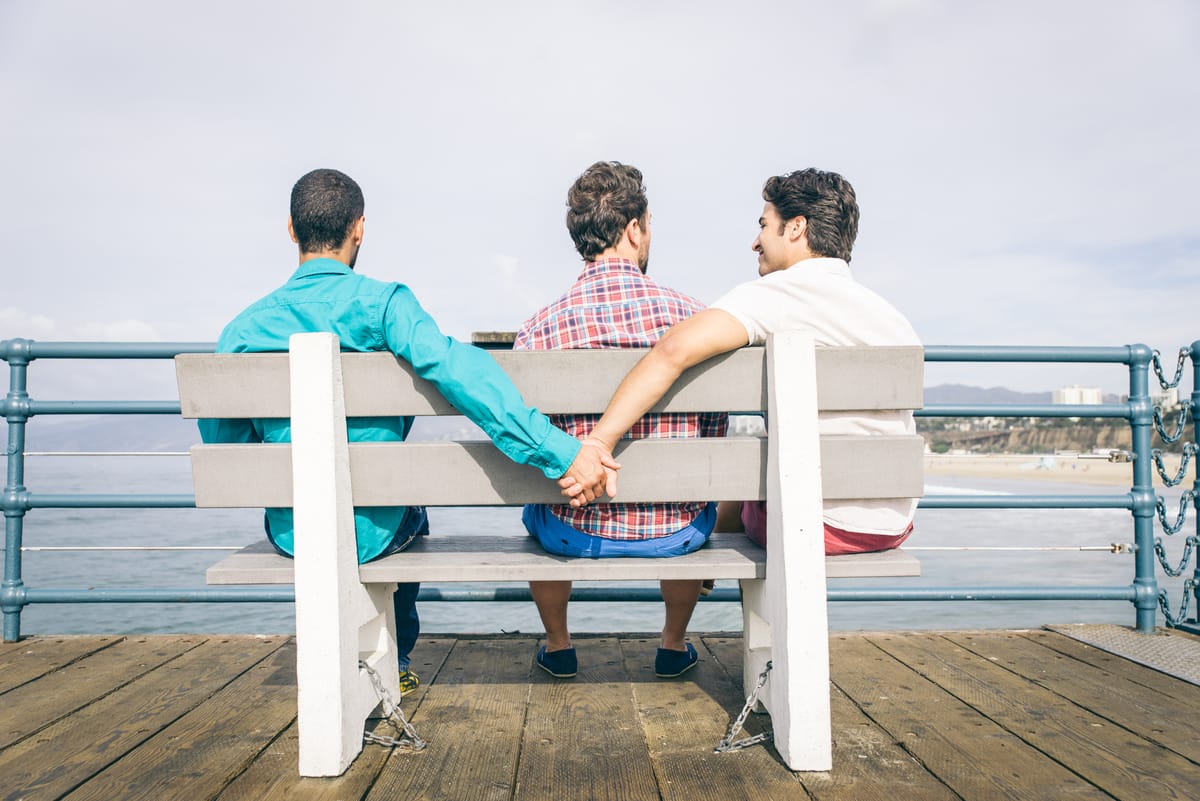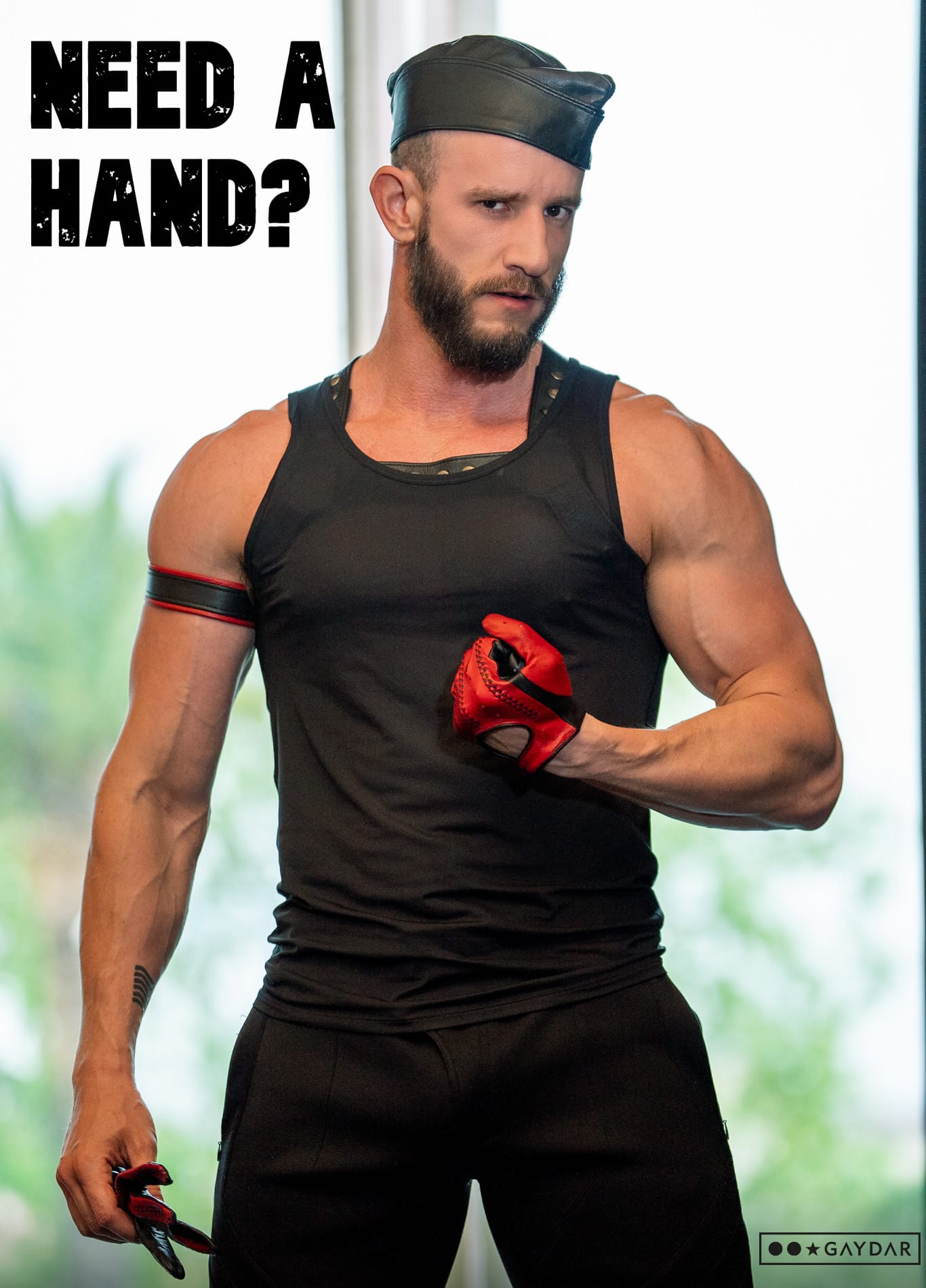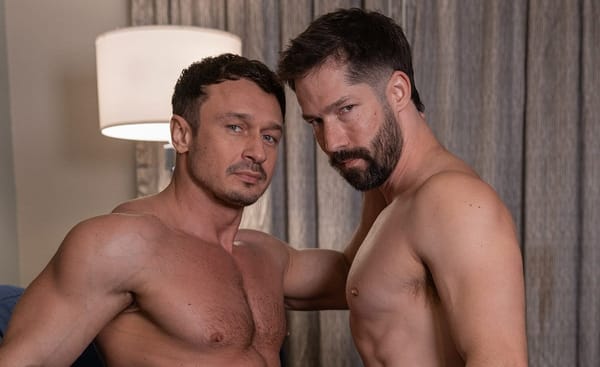A gay man's guide to open relationships
How do queer couples navigate this tricky terrain?

For our podcast, How To Date Men, we caught up with David from Gay Men's Therapy - a specialist psychotherapy and counselling service for gay and queer men and men attracted to men.
One of the most common issues that queer men are bringing into the therapy setting is the challenges around navigating an open relationship.
In the conversation, we talk consensual non-monogamy, attachment styles, and the importance of effective communication.
In our last conversation, you mentioned that one of the common issues that queer men bring into the therapy setting is around polyamory and open relationships. I wanted to sort of dig into that a bit more - what are some of the common scenarios that men are grappling with in this context?
I terms of an open relationship, I think one of the main things that couples struggle with is how they trust each other.
Another thing is once they've decided to launch themselves into an open relationship and then the problems that can arise around who's sticking to the rules, and what were the rules - who's breaking them, what happens if they feel betrayed, let down, and the arguments and the disagreements that take place as a result of that.
There are so many reasons why a couple might decide to open up their relationship, but once they've done it, there is going to be an element of risk - however stable a relationship is.
With those different scenarios that you've been talking about, they're mostly after the fact examples - couples aren't generally coming into therapy to get some support to help navigate through that conversation into an open relationship. It's almost, we've decided to open the relationship. Things have gone a bit pear-shaped. How can we fix it from here? Is that correct?
I think that's the more likely thing.
It seems that polyamory - having an open relationship - is the default setting for men who have relationships with men. Are queer men incompatible with monogamy?
Consensual non-monogamy is the official terminology now for an open relationship.
When a couple decide to go into something like that, it's important for them to consider why they are going into it. It might be that one of the couple has decided that they want to explore things outside their relationship, and they need to be clear about what those reasons are. They need to have the thought process first of all. Am I doing this for my personal growth and development, variety, sexual exploration, or is there something wrong with my relationship? Do we have problems and we're not having much sex and things like that? So I think it's important to be clear about why a person might want to go into an open relationship.
And then of course they have to begin to discuss that with their partner, which is a very delicate conversation. And I would say straight away that this takes time.
I think too often mistakes are made in open relationships because they go to the pub, have a beer and go, okay, let's open it up without actually kind of really thinking about anything to do with how are they going to arrange an open relationship, the boundaries they set, the rules they set, the taboos they set, all the kind of various things.
And all of those things can take weeks or maybe even months to get to before a couple decide that they really feel that they could handle an open relationship. And I think they also do that from a place of stability.
One of the things I find with some of the younger people I work with is they meet somebody, start a relationship and immediately want to open it up. There's a lot of sex out there. There's a lot of fun. Apps have really kind of transformed the way in which people navigate physical relationships with other people.
I don't think that's the most successful way to go about it, honestly, in terms of what I get into the therapy space. But if people are in a relationship that's rock solid in its real context, you know, all the interlinking things that make a relationship really solid between a couple, not just their love for each other, but all the wider aspects of their relationships and interlockings with family and friends and so on, then they begin to think, well, let's go and do it and let's see what it's like.
Even then there's always going to be an element of risk. These are pitfalls that can happen to people and they don't intend for that to happen.
Is consensual non-monogamy something different to polyamory?
Consensual non-monogamy is very much about sex and wanting to explore other aspects of sex. Polyamory is about wanting to form other emotional attachments with other people.
For example, a couple that I've worked with recently - they're in an open relationship but one of the couple became aware that a particular person seemed to be around an awful lot. And as a result of that, feelings were beginning to develop between the two - which was a breach of the boundaries that they'd agreed.
But people go into polyamorous relationships where they're okay about forming emotional attachments with other people.
It just depends on what people want and how they can handle that. Obviously, there are going to be jealousies and insecurities and uncertainties that develop if your boyfriend suddenly says, actually, my friend I've been seeing occasionally has got really big feelings for me. And it's like, so what about us? What's the core of our relationship? Is that under threat?
One of my friends always says that he's got no limit on love. He can love multiple people. It's not a problem. But what you said there is kind of the crux of the matter, isn't it? What is the core of the relationship? How do we define our relationship? What does sex mean in the context of our relationship? That's a really interesting conversation for people to have if they're in a couple, isn't it?
One of the frequent issues around an open relationship is the fact that sex between two guys begins to sort of wane. And obviously we go into relationships and we're all over each other like a rash for hopefully a long time, but then eventually things kind of calm down. And maybe they calm down and they still remain absolutely lovely and the amount of sex that the couple enjoy with each other is enough. But sometimes people have different libidos, sometimes there's an age difference, there might be different levels of experience before the relationship.
The most important thing about any couple deciding to open up a relationship is how they communicate with each other and how they're going to evaluate the openness of the relationship.
Another issue that can happen in an open relationship is how much sex is somebody having - does one partner feel jealous that the other partner is having more sex than they are. Some people just don't like the idea that they're just going to have to go out and hook up with somebody. They're not into it at all. So there's all sorts of imbalances that can happen.
If open relationships work really well, they can enhance relationships, they can grow relationships, they can enhance the sexual connection.
You also have to decide, what are we going to share with each other? Is it the don't ask, don't tell, or close my eyes and pretend it's not happening? Or are we going to have a jolly chat about what we've been up to and say, I had some real fun with this guy a couple of days ago, or this was a disaster last night, or something?
Is there a correct way to have an open relationship? Is there some sort of standard or model that we could objectively measure ourselves against?
There are so many aspects to it - when you think of two people coming together in a relationship, they bring their own relationship history, their own emotional history.
We're going to come into a relationship with two quite different experiences and therefore expectations.
What I think is particularly specific to gay men is the fact that as sexual people, we do like a lot of sex and there is a lot of sex available and that puts a lot of pressure on some people's relationships. The idea that they can explore that outside their relationship becomes quite a challenge for a lot of gay couples. I think there's an almost social pressure to open up your relationship because you'll find that lots of your friends are doing it too.
It is a bit of a double edged sword - there's pressure from your your gay peers, because everyone seems to be having a lot of sex. But then, from other parts of your life, there can be a sense that if you're opening your relationship up, that kind of feels like that relationship has failed somehow. Like, why haven't you been able to sustain monogamy?
Another important factor is what kind of attachment style do people have?
If you are securely attached, which means that by and large you come from a stable childhood and background, then your ability to have a stable relationship with somebody through mirroring of what you've grown up with gives you a much better chance.
But then if you are, for example, anxiously attached, anxiously attached people never quite believe that they're loved. So they're constantly looking for the fact that they want to feel love, but even if they get it, they're not quite sure. That can be to do with the way that they have experienced relationship and security in their childhood.
Then you've got avoidant people who really struggle with intimacy. Now, as children, they might not have had much love and tactile attention from their parents. They might have been quite withholding. So they don't know what that kind of warmth is like. And if they come close to it, they fear it.
A lot of people struggle with intimacy. I find that as an aspect of my work in the therapy space is quite a common thing - how men struggle with intimacy with other people.
Is that linked to cultural background in some way, or is it just a random lottery depending on how your parents connected emotionally with you?
There's very much a cultural element depending on the ethnicity of the person involved. I think when you think about us in this country, we've gone from being handshakes at a distance, you know, and not being hugged by our parents, to a completely different way of being and there's a lot more warmth and intimacy and you see parents with their children in way that you wouldn't have seen years ago. So that gives people positive role modelling about what intimacy is about.
But if you come from a background where that was something that was withheld, then you're not going to have the confidence. And actually, someone approaching you being too close might feel overwhelming and you want to back away from it, which is going to be a challenge if that person wants to be in a relationship and you're struggling with how much they want to give you.
Does abandonment link to anxious attachment issues? I always find with people who are bringing abandonment issues into a relationship - that's a lot of hard work for everyone.
It is very difficult. There are lots of big and small aspects of what abandonment can feel like. And especially if somebody has three or four of those particular experiences in their life, then they're going to feel very insecure and trust - which is a core part of a solid relationship - would be very hard for them to feel.
The other type of attachment is called a disorganised attachment where there's a bit of a yo-yo effect for people on an emotional level. They can be really into something and then they move away. Often those people sadly have some kind of abusive experience in their early childhood or adolescence.
It's amazing that anyone has a relationship at all - there's so many barriers to us getting together and having anything meaningful?
I think people who are in successful relationships are doing incredibly well. Most people are going to have bumps in the road.
Relationships evolve over time - deciding whether or not to open your relationship and explore consensual non-monogamy is an aspect of that. What are some practical strategies people could use to keep shifting those boundaries as their relationship evolves?
I keep coming back to the same word - it's about communication and being open.
It's also about not harbouring fear or worrying about something - having the courage and the commitment to the relationship to say, I think we need to have a conversation.
People don't find that very easy, which is where the couple then drift apart. And so the idea of getting close together again gets more and more difficult for them.
If someone was having challenges navigating the dynamics of an open relationship, what advice or guidance would you give them?
As a therapist, my role is not to give advice. I'm going to encourage people to come up with the answer.
But I think if people are struggling with their open relationship, they need to sit down and really begin to talk about what's not working.
Couples therapy is a good place to go as well. Every couple I work with, the most obvious thing that comes into play straight away is how they're communicating or not communicating with each other. And so you actually really kind of give a few lessons on how that communication can be much more effective. And that can often be enough for a couple to go off and really begin to able to understand each other and talk to each other.
In couples therapy, as opposed to individual therapy, you can be much more directive - you want your clients to go home with some homework. Even something as simple as intimacy - where's the intimacy gone? Go home and practice cuddling or practice kissing.
One of the things about relationships drifting is a lack of confidence. Once the sex begins to diminish, which is the most intimate thing you can have, then confidence in trying to get back to that can be really, really hard.
The NSFW edition
If you want to admire some man-on-man action, our NSFW edition gives you every inch.
Sign in and check out our NSFW content - it's free!








